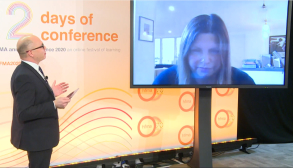HFMA 2020: the key to being a successful leader

Ms Horlick said these characteristics were needed in the NHS as much as in the private sector. In an NHS trust, she said the chief executive had to provide the vision and then have an excellent team to execute it. The leadership also had a major role in establishing the culture of an organisation.
Drawing on her own board level experience in the NHS as a non-executive, including nine years in Hampshire, she said it was also vital for the medics to be closely aligned with the professional managers. ‘If you have a lot of aggro between medics and managers, you will never end up with a well-run organisation,’ she said.
More controversially, she suggested that charisma was also vital – adding that this was probably not something that could be learnt. ‘There are people who are just born with charisma,’ she said. ‘And if you are going to be a really good leader, it is really important to have charisma because it is about inspiring people to achieve.’
Some delegates offered a contrary view, suggesting that introverts could provide excellent role models and lead by example.
Ms Horlick’s view of NHS management was that there was great talent at senior level and she also praised the flatter management structure in the UK in general – with more of a focus on working in teams – compared with the more hierarchical structures in Europe.
Once Covid-19 is over, Ms Horlick said the government and NHS would need to reflect on the pandemic. She suggested that it was clear the NHS hadn’t been sufficiently prepared for a major outbreak – this could be seen in the shortage both of personal protective equipment in the early months and of intensive care beds.
She said the economic impact had been significant and any further pandemics would compound problems, which would result in less tax take for the government and more difficulties in funding key services such as the NHS. These ‘big issues’ would need to be tackled.
In general, she identified investment in NHS estate, more integration of primary and secondary care, with more diagnostics undertaken in primary care, and a solution for social care as key issues that need to be addressed.
Returning to her leadership theme, she said it was important to build management teams from diverse backgrounds. ‘For a successful management team, you need some tension to be successful and creative,’ she said. ‘You need people from different social and ethnic backgrounds and you need men and women. I’d very strongly advocate for diversity in all its senses and ensuring you don’t simply have a whole lot of yes men, who just agree all the time with the chief executive.’
Referring to concerns that there are too few women in the most senior roles in NHS finance, Ms Horlick said that obstacles to progression needed to be removed. But she said that sponsorship – having someone senior in the organisation who ‘believes in you and can push for you’ – was a practical measure that should be adopted more widely.
Related content
The Institute’s annual costing conference provides the NHS with the latest developments and guidance in NHS costing.
The value masterclass shares examples of organisations and systems that have pursued a value-driven approach and the results they have achieved.